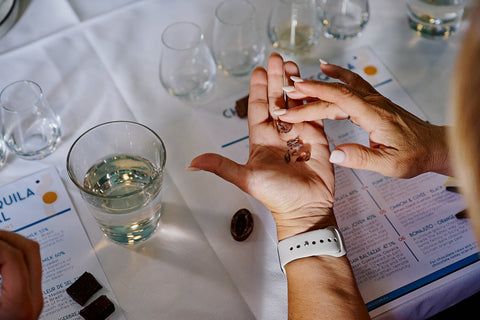As we celebrate World Environment Day, it's a great time to reflect on the impact of our choices and how we can make a positive difference for our planet. One area we can all make a significant contribution is our food choices - including why choosing bean-to-bar chocolate not only tastes better, but benefits the environment.
What is Bean-to-Bar Chocolate?
Bean-to-bar chocolate refers to the process of making chocolate from scratch, that is the chocolate maker is involved in the growing of the cacao beans, the processing of beans, and of course crafting all of this into a bar of chocolate.
Unlike mass-produced chocolate, which often relies on industrial processes and additives, bean-to-bar chocolate is crafted with care - sourcing ethically grown and sustainable cacao beans - and controlling the entire production process.
Learn more about bean-to-bar chocolate here.

Why is Bean-to-Bar Chocolate Better for the Environment?
1. Supports Sustainable Agriculture
Bean-to-bar chocolate makers prioritise sourcing their cocoa beans from sustainable and environmentally conscious farms. By supporting these farmers, they help promote sustainable agricultural practices, such as organic farming, agroforestry, and biodiversity conservation. These practices contribute to soil health, reduce deforestation, and protect habitats for wildlife.
2. Transparency and Traceability
One of the key advantages of bean-to-bar chocolate is the transparency it provides. Craft chocolate makers often establish direct relationships with cocoa farmers, ensuring fair wages and working conditions. By knowing the origin of the cacao beans and having traceability throughout the supply chain, consumers can make informed choices and support both ethical and sustainable practices.
3. Reduced Carbon Footprint
The bean-to-bar process generally involves smaller-scale production, which translates to lower energy consumption and reduced carbon emissions compared to large-scale chocolate manufacturing. Additionally, some craft chocolate makers prioritize local sourcing, further reducing transportation distances and associated carbon emissions.
4. Preserving Flavour and Diversity
Bean-to-bar chocolate makers take pride in showcasing the unique flavours of different cacao varieties. This emphasis on flavour diversity promotes the preservation of heirloom and rare cocoa varieties, encouraging farmers to continue cultivating them. By supporting bean-to-bar chocolate, consumers contribute to the conservation of chocolate's rich genetic heritage, which bean-to-bar makers are keeping alive.
5. Waste Reduction and Packaging
Craft chocolate makers often prioritise sustainable packaging options, such as recyclable or compostable materials. Furthermore, they are more likely to focus on reducing waste throughout their production processes and minimising environmental impact. By choosing bean-to-bar chocolates, consumers can contribute to waste reduction and support a more circular economy.

This World Environment Day, let's celebrate the power of our choices and appreciate the role we can play in protecting our planet. Opting for bean-to-bar chocolate is not just about savouring a delicious treat; it's a step towards sustainability. By supporting sustainable agriculture, reducing carbon footprints, promoting flavor diversity, and reducing waste, bean-to-bar chocolate emerges as a better choice for the environment. So, indulge in your favourite bean-to-bar chocolate - support artisan makers - and savour the sweet taste of sustainability.
Remember, every small action counts when it comes to protecting our environment. Happy World Environment Day!
